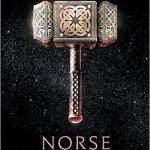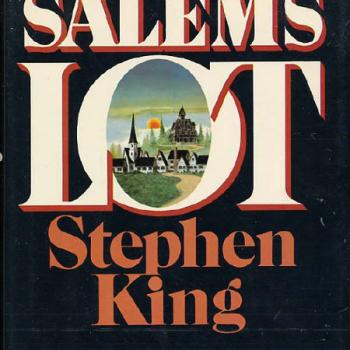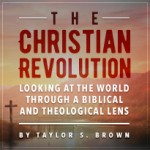It is that time of year again. The time when Christian writers everywhere post their favorite books of the year! Not to be left out from the conversation I have compiled a list of some of my top books read this past year. Of course it is three days in to 2018 at this point, so I am few days late. However, those extra days gave me some time to finish up a few more books. The books listed here are not necessarily published in 2017. Rather they are the books (organized by genre) that I read throughout the past year that either stood out the most to me or impacted me in a particularly noteworthy way. So without further delay here are my top books of 2017.
History
Brand Luther: How an Unheralded Monk Turned His Small Town into a Center of Publishing, Made Himself the Most Famous Man in Europe–and Started the Protestant Reformation by Andrew Pettegree (Penguin, 2015)
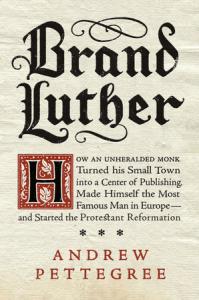
This book not only takes the cake for the best history book I read in 2017, it may also win the all-time award of “Book with the Longest Subtitle.” All joking aside, Brand Luther is a wonderful book that delves into one of the most important, yet most ignored, historical developments that spurred on the Protestant Reformation, and thus the mixed bag that is the modern Western world: the rapid rise of the printing industry in Germany in the late-medieval period. It is often easy for us as moderns—with printed books in both physical and digital formats readily available—to forget how revolutionary the printing press was in the late Middle Ages. Without the rise of the printing industry in the late 15th and early 16th centuries, Luther’s ideas would likely have stayed confined to the academic cloisters of Wittenberg, rather than spreading like a wildfire throughout Germany and later northern Europe. Andrew Pettegree does a superb job of outlining the growth and impact of printing in relation to Luther’s reforming efforts.
Theology
On Augustine by Rowan Williams (Bloomsbury, 2016)
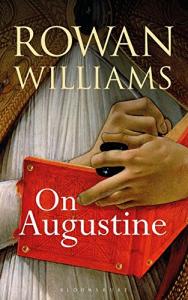
I used to think St. Augustine was almost solely responsible for the ills that plague Western Christianity. If it wasn’t for him, so I thought, we wouldn’t have to deal with the extreme predestinarianism of Calvinism, the lack of mystery and beauty that the Eastern church maintained, and the reading of Romans 7—and thus all of Paul—as an existential crisis of the believer (which was then worsened by Luther’s reading of it as meaning Christians are simul justus et peccator). Then I actually began to read some Augustine, as well as some theologians who wrote on him. While I still think that Augustine got a few important things wrong in his theology (again, his predestinarian tendencies in his later writings), I have now come to see him as one of the most profound and illuminating thinkers of not only the Christian Church, but of intellectual history in general. A huge part of my ongoing shift in viewing Augustine was thanks in large part to Rowan Williams’ fantastic treatment of several key Augustinian themes in his On Augustine. Williams (ever the brilliant writer and theologian himself) moves through several key theological topics in the book, ranging from Augustine as an interpreter of the Psalms to the Bishop of Hippo’s understanding of the Trinity. The two standout chapters in my opinion though are an analysis of Augustine’s understanding of evil as a privation of the good (“Insubtantial Evil”) and his understanding of the doctrine of creatio ex nihilo (“‘Good for Nothing?’ Augustine on Creation”). The book is somewhat heady, but it is a marvelous read, the work of a master theological thinker on a master theologian.
Biblical Studies
Salvation by Allegiance Alone: Rethinking Faith, Works, and the Gospel of Jesus the King by Matthew W. Bates (Baker Academic, 2017)
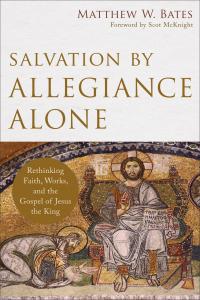
I wrote a pretty thorough review of this book earlier in the year. In the book Matthew Bates challenges the traditional understanding of salvation by faith alone. Bates’ thesis is that the Greek pistis word group, typically translated as “faith” in most English translations of the New Testament, should actually be rendered as “allegiance” to better convey the more complex and holistic nature of Christian belief and behavior in relation to salvation. From my earlier review:
What exactly does the New Testament mean when it speaks of faith? More specifically, what does it mean when it speaks about salvation by faith? Especially for those of us who inhabit one of the various Protestant traditions of Christianity, our understanding of salvation by faith typically revolves around a conception that emerged first with the Reformers like Luther and Calvin, and was further refined by evangelists like John Wesley and George Whitefield. This model of salvation by faith centers on the idea that all one must do to receive the gift of salvation is to realize his/her inability to do anything to merit salvation and instead place his/her trust in the finished work of Christ’s atoning crucifixion.
While this model of salvation is deeply entrenched in Protestant—and especially evangelical—thought, it is reasonable to ask whether it is the best model. This is exactly what Matthew Bates asks and seeks to address in his newest book Salvation by Allegiance Alone: Rethinking Faith, Works, and the Gospel of Jesus the King (Baker Academic, 2017). Bates believes that the Church—particularly the Protestant sector—has a grammar problem when it comes to talking about salvation by faith. First, the very use of the word of English word “faith” is problematic, as increasingly in our culture it carries negative connotations of being hostile to rationality, and of being a vague, squishy amorphous “faith in faith.” Second though, is that most Protestant soteriological systems do not adequately convey the holistic nature of faith, works, justification, sanctification, and final judgment that the New Testament writers speak of, especially the Apostle Paul. Bates thus believes that an in-depth surgery of conventional “faith” language is needed when talking about the Greek word pistis. Instead of saying that we are saved by faith alone, Bates proposes that a better translation, and thus a better conceptualization, is that of salvation by allegiance alone.
The book is fantastic. Bates does an excellent job of looking at what the pistis word group entails contextually and that the concept of allegiance does a better job capturing the multi-faceted nature of what biblical “faith” really entails. I’ll end with my review summary of the book:
Bates’ book is excellent. It is thoroughly researched and argued, and is very convincing on many levels. Not only does Bates provide a cohesive synthesis of the New Testament data which speaks of the need of both grace and obedience in the Christian life (something many Protestant scholars and theologians have either glossed over or tried to explain away), he does so in a way that is thoroughly compelling. By both reclaiming the oft-neglected kingship element of the gospel proclamation, and incorporating it into a more holistic concept of salvation by allegiance, Bates presents an interpretation of the biblical data that connects what are often thought of as disparate strands of thought in the New Testament. Bates’ allegiance model makes better sense of Jesus and Paul as both proclaiming the same gospel message, rather than as being opposed to one another, as figures like Adolf von Harnack and his progeny have (wrongly) argued over the last century or so. When we understand the pistis language of both the Gospels and the Epistles as embodied allegiance that is fundamentally oriented toward Christ as Risen Lord and King, many pieces of historical and theological data that didn’t seem to quite fit beforehand now begin to fall readily into place.
Biography
America’s Pastor: Billy Graham and the Shaping of a Nation by Grant Wacker (Belknap, 2014)
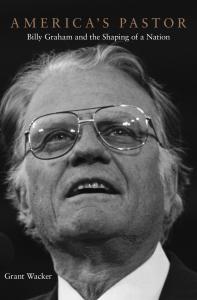
Billy Graham is one of those American figures that I have often looked askance at over the years. Having grown up in the heart of the Bible Belt, I developed a healthy distaste toward nearly all forms of televangelism, not least because so many prominent televangelists have scammed and taken advantage of thousands of people. I always lumped Graham in this category, having seen him on TV many times and having heard his very American, very neo-evangelical preaching. Grant Wacker’s biography of Graham upended this negative perception of Graham and his work. While Graham’s theology and preaching were, and are, fairly simplistic and Americanized, Wacker shows that Graham himself almost always had the guiding orientation of an earnest evangelist. Even with all his flirtations with American presidential power, Graham’s lifelong goal was to try to bring as many people to Christ as possible. If this meant courting political power, then Graham was willing to do so. Of course Wacker’s biography is not hagiographical. Graham was a fragile and corruptible human just like the rest of us. Perhaps Graham’s most notable failing was his continued support of Richard Nixon, even as the true details of the Watergate scandal and Nixon’s own problematic character came to light. That being said, Wacker’s biography helped me to see that Graham is not a man to be lumped in with all the morally suspect televangelists of yesteryear. Despite his missteps and failings, Graham never stopped seeking to bring people to know the love of God in Christ.
General Nonfiction
Console Wars: Sega, Nintendo, and the Battle That Defined a Generation by Blake J. Harris (Dey St./HarperCollins, 2014)
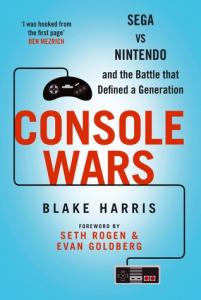
Since I finally completed my Master of Divinity and Master of Theology this past year, I allowed myself some time to read a few things outside the purview of theology, biblical studies, and church history (yes, I know I should have been doing this all along). Console Wars thus came as an extremely pleasant surprise. As a millennial, I have grown up with video games. Many, if not most, of my generation was shaped by home consoles and games from companies like Sega, Nintendo, Sony, and Microsoft. My first video game console was a Nintendo 64, followed quickly by a Game Boy Pocket and then a Game Boy Color. I also played a substantial amount of Super Nintendo games (the predecessor to the N64) at my friend’s house. I was thus a “Nintendo kid” for some of my earliest formative years (I now spend most of my play time—when I can find it—on a Playstation 4 and Xbox One). I would have arguments with friends from school about the merits of Nintendo vs Sega vs Sony games. Console Wars then was like a fond walk down memory lane for me. Blake Harris does a fantastic job of detailing the “war” between the two corporate giants of the video game industry in the early 1990s: Nintendo and Sega. Even though I came into video games near the tail end of the war, I still remember the effects of it fondly. Harris’ narrative details the all-out corporate war that both companies engaged in to be the dominant player in the home console industry, led by their respective mascots: Mario and Sonic the Hedgehog. While Nintendo ended up winning the “war” (they’re still making games and consoles, while Sega abandoned the home console market and devoted its efforts solely to cross-platform game development and publication in the early 2000s), the effects of it are still felt by a generation who came of age during it. Harris’ work was some of the most fun I had reading a book this year.
Fiction
Silence by Shūsaku Endō (Picador, 1969)
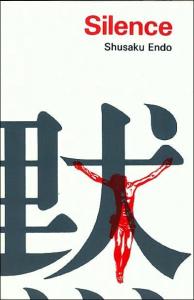
Shūsaku Endō’s book is one of the most difficult and beautiful novels I have ever read. It follows the fictional Jesuit priest Sebastião Rodrigues in the real historical era of the Takugawa shogunate in Japan. Set against the backdrop of the extreme persecution of the “Hidden Christians” in the 17th and 18th centuries, Endō’s novel is a deeply moving tale that deals with the spiritual ambiguities of the suffering of the faithful, the seeming of silence of God in the face of evil, and the entrance of God into human suffering in the person of Jesus Christ. While Martin Scorsese produced beautiful film adaptation of the book back at the end of 2016, it leaves out a key part at the end that reshapes how Endō’s work is understood. Without giving too much away (because you really should read Silence), suffering and the silence of God do not get the last word in the novel. Silence is considered by many to be one of the best novels of the twentieth century. After having read it myself, I agree with them.


